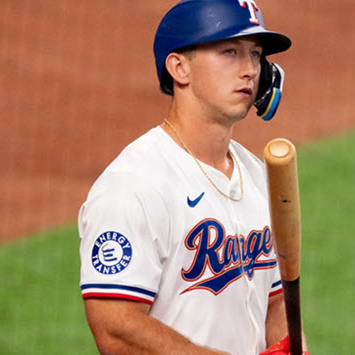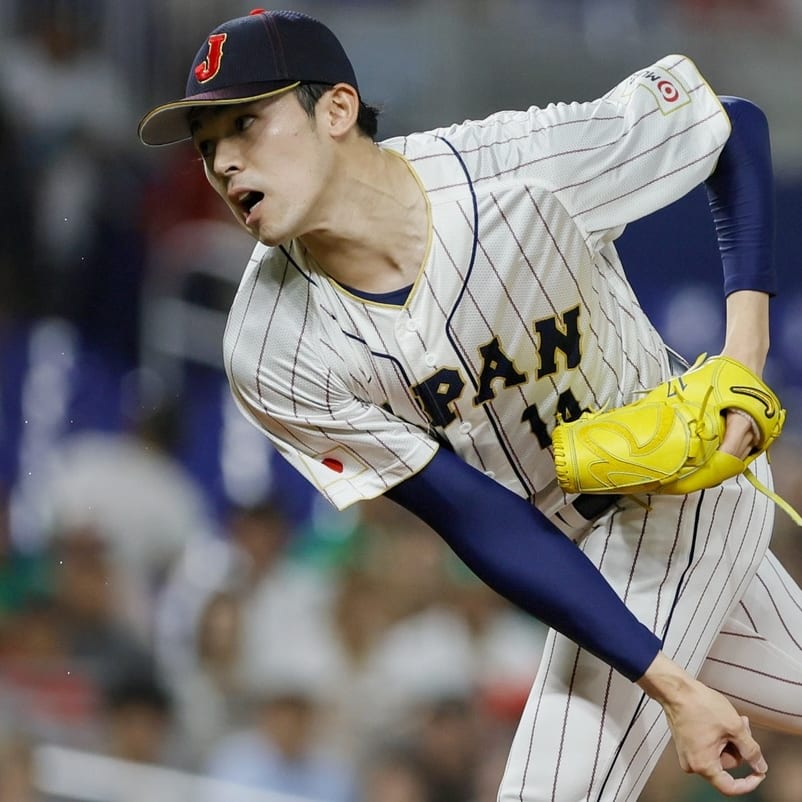This article is part of our One Man's Trash series.
During the season, I'm going to look at some of the players being dropped by fantasy managers to see if their decisions were a little rash. Some of the players dropped will provide fantasy value going forward. Someone who will remain nameless decided it was a good idea to drop Robbie Ray and Tyler O'Neill last year in the first couple of weeks.
The players I'm looking at this week are a mix of immediate adds and those who are just a tweak or two away from taking a step forward.
For the information, I'm going to focus on players dropped at the NFBC and CBS. Both Yahoo and Fantrax's add and drop numbers are based on the past day or so and can be dominated by streaming starters. CBS and NFBC are based on the past week.
As a general rule, I will stay away from injured players and just focus on players expected to play.
Hitters
Jesus Sanchez (89 NFBC Drops, -3% at CBS)
The 24-year-old Sanchez seems to have the potential to be an elite power hitter, but several traits are holding him back.
First off, there are no objections that he can hit the ball far. His max exit velocity is in the 96th percentile and his barrel rate is in the 68th percentile. For this season, that's about where the positives end.
His strikeout rate (28 percent) remains around 30 percent.
His groundball rate (48 percent) will limit the number of home runs he
During the season, I'm going to look at some of the players being dropped by fantasy managers to see if their decisions were a little rash. Some of the players dropped will provide fantasy value going forward. Someone who will remain nameless decided it was a good idea to drop Robbie Ray and Tyler O'Neill last year in the first couple of weeks.
The players I'm looking at this week are a mix of immediate adds and those who are just a tweak or two away from taking a step forward.
For the information, I'm going to focus on players dropped at the NFBC and CBS. Both Yahoo and Fantrax's add and drop numbers are based on the past day or so and can be dominated by streaming starters. CBS and NFBC are based on the past week.
As a general rule, I will stay away from injured players and just focus on players expected to play.
Hitters
Jesus Sanchez (89 NFBC Drops, -3% at CBS)
The 24-year-old Sanchez seems to have the potential to be an elite power hitter, but several traits are holding him back.
First off, there are no objections that he can hit the ball far. His max exit velocity is in the 96th percentile and his barrel rate is in the 68th percentile. For this season, that's about where the positives end.
His strikeout rate (28 percent) remains around 30 percent.
His groundball rate (48 percent) will limit the number of home runs he can hit.
He's pulling too many balls, with a .270 BABIP with no shift in place and a .234 BABIP with a shift.
Finally, an extreme handedness split (.723 OPS, 24 percent strikeout rate vs. RHP, .265 OPS, 45 percent strikeout rate vs. LHP) has him only playing against righties.
He's just a streaming option when the team is facing a bunch of righties.
Jonathan Villar (65 NFBC Drops, -2% at CBS)
The Angels signed Villar after he was released by the Cubs. Villar was immediately put in the leadoff role, where he failed miserably. So far with the Angels, he's hitting .167/.222/.167 with zero homers and one steal. He's moved out of the leadoff spot and is hitting between sixth and eighth in the lineup.
The reason he's declined so fast is that he's slowed down. Here are his recent sprint speeds and percentile rank
| Season | Sprint Speed (ft/s) | Percentile Rank |
|---|---|---|
| 2019 | 28.0 | 73rd |
| 2020 | 27.1 | 57th |
| 2021 | 27.3 | 58th |
| 2022 | 26.7 | 40th |
The lack of speed has limited his infield hits, as he hits a ton of groundballs (59 percent in 2022, 54 percent for his career). For his career, his BABIP is at .333. This year, it's down to .283.
The 31-year-old needs his sprint speed to inch back up to over 27 ft/s.
Jake Meyers (60 NFBC Drops, -2% at CBS)
I was a little surprised to see Meyers on the drop list since I was looking to add him last week. While Meyers has not been great at the plate (.243/.289/.357, one homer, zero steals in 76 plate appearances), he was one of the better available hitters in my deeper leagues thanks to Houston's five-game week.
The 26-year-old showed a balanced approach in 2021 when he hit .260/.323/.438 with 6 homers and 3 steals in 163 plate appearances. So far this season, he's been a complete drain.
He's missing a ton of balls (32 percent strikeout rate), and when he does make contact it's on the ground (50 percent groundball rate). Additionally, all his power metrics are down compared to last season. I'm wondering if he's not 100 percent healed from his off-season shoulder surgery.
There is some hope that he's powering up, with his ISO going from .048 in June to .148 in July. Keep coming back to check on him to see if he keeps improving. The early struggles might hide a breakout.
At least for now, the Astros believe in him, as he's started in nine of the last 10 games.
Isaac Paredes (55 NFBC Drops, -12% at CBS)
I'm a little surprised to see Paredes on the list since he's hit 13 home runs in 182 plate appearances this season while qualifying at both second and third base. Those are the only positive traits he has provided, however. His .226 AVG and zero stolen base potential make him a single-category contributor. A .200 BABIP is the main reason for his struggles and nothing besides blind faith will push it higher.
A few factors are keeping down his BABIP. First, he has a 53 percent pull rate, so the shift will work against him.
Second, he doesn't have elite power, and that's why he has to go so pull-heavy. The only way for him to hit a home run is to pull it.
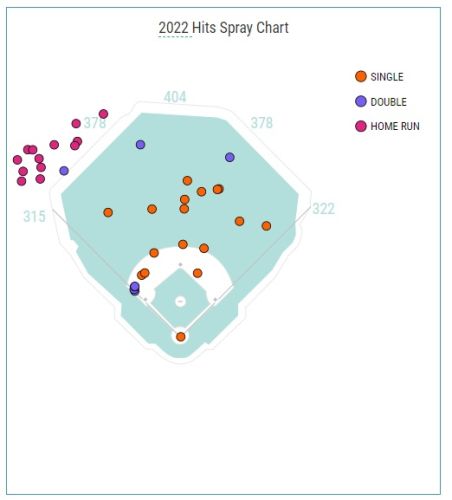
The flyballs that don't go for home runs are outs.
All the negative factors have his StatCast xAVG at .214, lower than his actual average. He's a power-only bat.
Pitchers
Mitch White (89 NFBC Drops, -2% at CBS)
White got blown up in his last start before the break against the Cardinals, allowing six earned runs in five innings. His full-season ERA got pushed up to 4.20, with matching ERA estimators. One bad start shouldn't be a reason to drop him, but after looking under the hood more, the move seems justified.
The biggest issue I found was a declining strikeout rate.
| Month | K/9 |
|---|---|
| April | 9.0 |
| May | 8.2 |
| June | 8.7 |
| July | 7.6 |
Editor's note: White pitched Thursday between this article being written and posted, and while he threw five scoreless innings, he struck out just one batter, driving his July K/9 down to 5.7.
The biggest reason behind the strikeout decline is a move from his four-seamer (five percent swinging strike rate, 48 percent groundball rate) to a sinker (two percent swinging strike rate, 60 percent groundball rate).
He's always had issues with walks, and this year is no exception (3.4 BB/9). He's right on the edge of having a useful WHIP.
The hope was that White could be streamed off a fantasy team's bench but with the drop in strikeouts, he's more of a waiver wire streamer.
Michael Pineda (80 NFBC Drops, -5% at CBS)
Why take a chance on Pineda, whose stats coming into last week's two starts included a 3.62 ERA, 4.73 xFIP, and 4.73 K/9? There was no way he would have been rostered if it wasn't for the 3.62 ERA. None. Ignore ERA.
As for the two-step, those managers who took the plunge got rewarded with 10 earned runs, 16 hits, three strikeouts, and zero walks over seven innings. By the time the week was over, his ERA was up to 5.22, right in line with his 4.84 xFIP.
Just another reason to never make roster decisions based on just ERA.
Dakota Hudson (80 NFBC Drops, -5% at CBS)
I hadn't noticed how bad Hudson has been. At the end of May, he had a 3.22 ERA, 4.87 xFIP, 5.0 K/9, 4.6 BB/9, and 57 percent groundball rate. The high groundball rate can help a pitcher suppress an ERA by maybe a half run, but not ~1.5 runs.
From June on, he has a 4.85 ERA, 4.76 xFIP, 4.9 K/9, 3.3 BB/9, and 49 percent groundball rate. He's been the exact same pitcher but is producing closer to the estimators.
One reason for his recent struggles is that his velocity has fallen off over his last two starts.
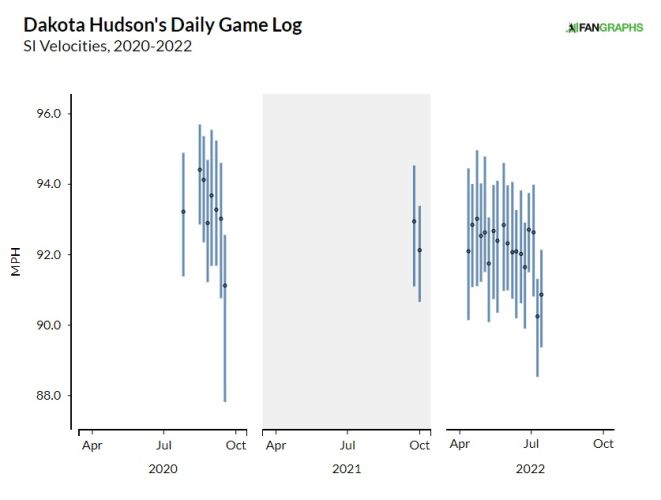
Besides a potential stream against the Pirates and Cubs, he should remain on the waiver wire.
Nick Pivetta (59 NFBC Drops, -5% at CBS)
Pivetta was enjoying a mini breakout. At the end of June, he had a 3.23 ERA, 4.06 xFIP, 8.7 K/9, and 1.12 WHIP. In three July starts, he has a 13.50 ERA, 5.64 xFIP, 8.8 K/8, and 2.25 WHIP. So what changed?
His walk rate is up (4.5 BB/9 to 6.2 BB/9) because his zone percentage is down from 51 percent to 48 percent.
Also, his average fastball velocity has dropped off in his last two starts.
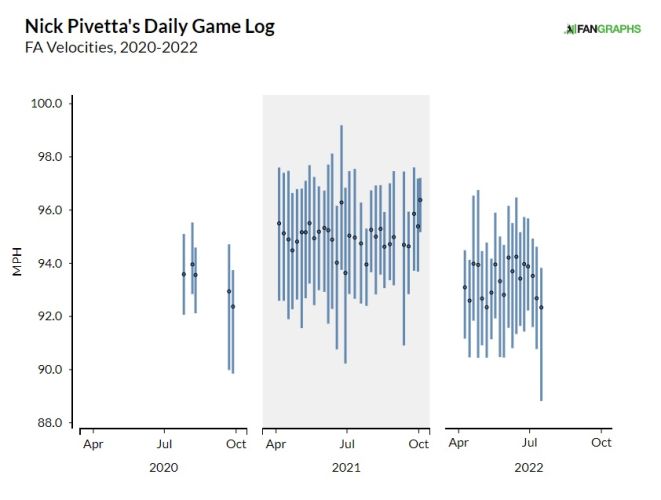
He has the two main signs of being hurt: he can't throw strikes and has diminished velocity. Maybe the break will allow him to heal. Maybe not. I'd avoid starting him and hope his velocity rebounds.







